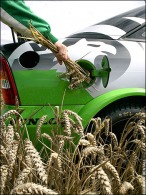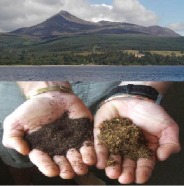"We can get fuel from fruit, from that shrub by the roadside, or from apples, weeds, sawdust— almost anything! There is fuel in every bit of vegetable matter that can be fermented. There is enough alcohol in one year’s yield of a hectare of potatoes to drive the machinery necessary to cultivate the field for a hundred years. And it remains for someone to find out how this fuel can be produced commercially—better fuel at a cheaper price than we know now".
Henry Ford, 1925
Henry Ford, 1925
Problem Statement

Fuel from corn
As the threat of climate change has increased, so has the awareness of the effect of human impact on the environment.[1] Concerns over the extent of this impact have lead to renewed interest in renewable energy sources and in biofuels.[2] As the world struggles to deal with the impacts of global warming, biofuels has been hailed as;
“ … a salvation from the twin evils of high oil prices and climate change”[3]
Biofuels are seen as a way of mitigating the effects of climate change by helping to reduce greenhouse gas emissions.[4]
The need to promote and subsidise biofuel production is greater than ever as the cost of conventional fuels has more than doubled since 2003 and the challenge of climate change has only increased.[5] The current subsidies offered by the British government have not been enough to encourage the development of domestic production and therefore the viability of a nation wide biofuel economy is unlikely.[4] However, small-scale systems, providing power for isolated communities with high associated transport costs, are a more viable option. For this reason, we have chosen to study relatively small-scale systems using rural locations as the case studies.
“ … a salvation from the twin evils of high oil prices and climate change”[3]
Biofuels are seen as a way of mitigating the effects of climate change by helping to reduce greenhouse gas emissions.[4]
The need to promote and subsidise biofuel production is greater than ever as the cost of conventional fuels has more than doubled since 2003 and the challenge of climate change has only increased.[5] The current subsidies offered by the British government have not been enough to encourage the development of domestic production and therefore the viability of a nation wide biofuel economy is unlikely.[4] However, small-scale systems, providing power for isolated communities with high associated transport costs, are a more viable option. For this reason, we have chosen to study relatively small-scale systems using rural locations as the case studies.

Two case studies have been chosen; the Isle of Arran off the west coast of Scotland and an area of commercial agriculture in the Thyolo district of Malawi. Both sites have high associated transport costs and would greatly benefit from being self sufficient in terms of energy. The general aim of the investigation is to determine to what extent each of the sites could be self-sufficient and to determine what effect any move towards self-sufficiency would have on the local economy, population and environment.
The research undertaken and the final report produced are part of a thesis project for a Masters in Civil and Environmental Engineering at the University of Edinburgh. The research will be undertaken by Thomas Mullan and Alasdair Walker and they will be supervised by University of Edinburgh Lecturer, Dr Antizar-Ladislao.
The research undertaken and the final report produced are part of a thesis project for a Masters in Civil and Environmental Engineering at the University of Edinburgh. The research will be undertaken by Thomas Mullan and Alasdair Walker and they will be supervised by University of Edinburgh Lecturer, Dr Antizar-Ladislao.
References
[1] UN Report; Sustainable Bioenergy: A Framework for Decision Makers; April 2007
[2] Msangi S, Sulser T, Rosegrant M, Valmonte-Santos R, Ringler C; Global Scenarios for Biofuels: Impacts and Implications; International Food Policy Research Institute (IFPRI)
[3]Biofuels look to the next generation; http://news.bbc.co.uk/1/hi/sci/tech/5353118.stm
4] House of Commons; Environment, Food and Rural Affairs Committee; Biofuels;Seventeenth Report of Session, 2002-03
[5] Review of EU Biofuels Directive; Public consultation exercise; April- July 2006
[1] UN Report; Sustainable Bioenergy: A Framework for Decision Makers; April 2007
[2] Msangi S, Sulser T, Rosegrant M, Valmonte-Santos R, Ringler C; Global Scenarios for Biofuels: Impacts and Implications; International Food Policy Research Institute (IFPRI)
[3]Biofuels look to the next generation; http://news.bbc.co.uk/1/hi/sci/tech/5353118.stm
4] House of Commons; Environment, Food and Rural Affairs Committee; Biofuels;Seventeenth Report of Session, 2002-03
[5] Review of EU Biofuels Directive; Public consultation exercise; April- July 2006
Picture Fuel from corn courtesy of http://www.ecofriend.org/entry/rush-for-biofuel-causing-damage-to-the-environment/
